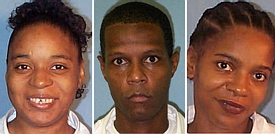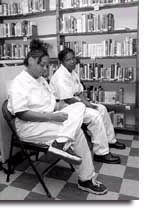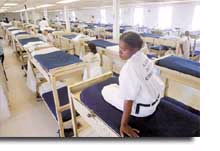Medell Banks Jrs.’ Conviction
for Killing A Non-Existent Child Is Thrown Out As A “Manifest Injustice”
By Hans Sherrer
For Justice Denied
Magazine Vol. 2, Issue 9
On
August 9, 2002, The Alabama Court of Appeals threw out Medell Banks Jrs.’ conviction
for killing a child that never existed. Medell is one of the Choctaw
Three who confessed to the murder of a non-existent child after days of
interrogation without being allowed access to a lawyer. The appeals court ruled
“a manifest injustice has occurred in this case.”
There are many
known cases of wrongful conviction for the murder of a victim whose body was
never found, because the person was in fact still living. Nebraska’s
governor commemorated one such error on March 25,
1987 by posthumously pardoning William Jackson Marion on the
100th anniversary of his hanging
for the murder of a man who turned up alive
four years later. In another notorious case, Antonio Rivera and Merla Walpole’s
protestations of innocence fell on deaf ears when they were convicted in 1975
of killing their 3 year old daughter ten years earlier. While imprisoned and
awaiting a retrial, their then 13 year-old daughter turned up alive and well in
San Francisco.
It is undeniably
outrageous for a person to be convicted of murdering someone who is alive, but a
case in Choctaw County, Alabama
goes far beyond that injustice. Not content with the mere crudity of prosecuting
a person for the murder of someone who is perfectly healthy – the great State
of Alabama indicted and prosecuted
two women and a man for the capital
murder of a child that never existed.
The
horrific saga of the Choctaw Three - Victoria Bell Banks, Medell Banks Jr. and
Dianne Bell Tucker - began in February 1999. Victoria
was in the Choctaw County
jail in Butner, Alabama,
a town of 2,000, when she decided to feign being pregnant as a ploy to get
released. The first doctor that examined her, Dr. Roshdy Habib, found no sign
of pregnancy. The second doctor that examined her claimed to have heard a fetal
heart beat. Victoria didn’t
permit either doctor to do a pelvic exam, no tests were performed on her, and there
was nothing in her physical appearance or behavior to indicate she was
pregnant. The second doctor’s cursory and unsubstantiated diagnose was
sufficient for Victoria to be
released on bond in May 1999, after she threatened to sue the jail for failing
to provide prenatal care.
On
August 3,
1999 the Choctaw
County sheriff encountered Victoria
and asked about the baby that would have been born in June based on what she said
while in jail. When Victoria told
him she had a miscarriage, the Sheriff escorted her to the office of the second
doctor that had seen her in the county jail. Victoria
was examined and it was determined that there was no evidence she had ever been
pregnant.
Three days later
Victoria
was taken into custody and the police wanted to know what happened to the
“missing” baby that had been the reason she was released on bond in May. The
police questioned Victoria, Medell Banks Jr., her husband she had been separated
from for several years, and her sister Dianne Tucker. All three are poor,
black, and for lack of a more politically correct word, have been described as mentally
retarded.
Victoria
has an IQ of
40 and Medell has an IQ of 57.

Victoria Bell Banks (l), her estranged husband, Medell Banks
Jr. (m), and her sister, Dianne Bell Tucker (r)
The three told the
police Victoria had pretended to be pregnant as a ruse to get out of jail, and
that she couldn’t have been pregnant because her tubes were tied in 1995. However,
after being questioned for extended periods of time without being allowed to
consult with a lawyer, they all confessed to participating in the killing of the
“missing” child. Based on their “confessions” the three were indicted for capital
murder on September 15,
1999:
a charge that carries a penalty of either death or life in prison without
parole. Facing the spectre of being executed in the electric chair if convicted
after a trial, all three were eventually pressured into pleading guilty to
manslaughter. Victoria only did
so after her trial had begun in November 2000, and Medell and Dianne did so six
months later as their trial dates approached.
The outrageousness
of the circumstances surrounding the alleged “confessions” of the Choctaw Three
is hinted at by the fact a tape recording the prosecutor claimed contained a
waiver by Medell of his right to an attorney, contains nothing comprehensible except his clear request for the police to
let him go home. The coercion involved in the false confessions by the
three Choctaw defendants is also indicated by the fact that Medell, in spite of
his mental limitations, only confessed under the duress of intense and
prolonged interrogation for days without the aid of consulting with a lawyer.
After languishing
in jail for almost two years, Medell Banks Jr. entered a “best interest” guilty
plea on May 7,
2001.
However, Medell didn’t go quietly into the night when he entered the guilty
plea that would send him into the hell of Alabama’s
third-world prison system. He told Circuit Court Judge Lee McPhearson, as he
had told anyone who would listen, that he was innocent:
“Your Honor, I don't think I have
been treated fairly. I got a son out there I love, I want to be with the rest
of my life, do what I can to be with him, show him all the love, respect I can.
For this here, I don't think I been treated fairly.
And it hurts me in my heart to get
time for something I didn't do. I wasn't there. I don't know nothing about
nothing. (R. 83.)”
On
June 25,
2001, Judge McPhearson sentenced
Medell Banks to 15 years in prison, the same sentence given to Victoria Banks
and Dianne Tucker. The same day Medell was sentenced, the judge granted a
motion by his lawyer for a medical examination of
Victoria
she had agreed in advance to undergo. Although Medell’s lawyer had previously obtained
X-rays that showed
Victoria
’s
fallopian tubes were sealed, an examination would prove with a scientific
certainty she couldn’t become pregnant naturally. That finding would constitute
medical proof the Choctaw Three were innocent of killing a child that had never
existed.

Victoria (l) and
her sister Dianne (r) in the prison library.
Medell’s court
appointed lawyers, Rick Hutchinson and Jim Evans had been inspired to go the
extra mile in fighting for him by his unwavering proclamations of innocence. They
realized, however, that Medell needed more to prove his innocence than the lack
of any physical evidence
Victoria
had a baby, including no hospital records, no doctor records, no one who ever
saw a baby, and the fact that she had a tubal ligation in 1995. Sympathetic
townspeople aided Medell’s lawyers to raise money from charities and church
collections to pay for
Victoria
’s
medical tests. Nationally renowned fertility expert Dr. Michael P. Steinkampf
was enlisted to conduct the examination. The author of numerous articles for
professional publications, and the Director of Reproductive Endocrinology and
Fertility at the University of Alabama School of Medicine in
Birmingham
,
Dr. Steinkampf conducted his examination of
Victoria
on
July 12,
2001. What he found
not only supported the innocence of all three defendants, but established it
with a scientific certainty:
Victoria
’s
1995 tubal ligation had been effective and it was physically impossible for her
to have become pregnant. After the examination Dr. Steinkampf said
Victoria
was sterile and “it was impossible” for her to have naturally conceived a
child. Medell had been proven right: all three defendants were the innocent
victims of a wrongful prosecution for the killing of a child that never
existed.
When interviewed, Dr.
Roshdy Habib, the doctor that first examined Victoria Banks at the Choctaw
County jail in February 1999,
concurred with Dr. Steinkampf’s conclusion: “The evidence is very clear that
she was not pregnant.” He also said that given her tubal ligation, she could
only have been impregnated “by the Holy Spirit.”
Relying heavily on
Dr. Steinkampf’s conclusion that Victoria Banks’ bilateral tubal ligation
prevented her from becoming pregnant, Medell’s attorneys filed a motion on July 16,
2001 to withdraw his guilty
plea, and on July 18,
2001 the
motion was amended to include a request for a “new” trial. During the
evidentiary hearing that followed in August 2001, the doctor that had performed
Victoria’s tubal ligation agreed
with Dr. Steinkampf’s conclusions. He further testified that absent a reversal
of the surgery, the only way she could become pregnant would be by vitro
fertilization. The prosecutor did not even suggest that Victoria
had undergone vitro fertilization.
On September 28,
2001 Judge McPhearson rejected
Medell’s motions to withdraw his guilty plea, for a new trial, and for the
charges be dismissed. The judge claimed that the only basis for doing so would
be if Medell had presented new evidence at the hearing that cast doubt on the
veracity of the facts underlying his conviction (that was solely based on his
guilty plea). The judge expressed the opinion Dr. Steinkampf’s testimony that Victoria
could not have become pregnant or had a baby would not have swayed a jury to
acquit Medell. In making his ruling, the judge totally disregarded that the
existence of the alleged child was not supported by any physical, medical, or scientific evidence.
Medell appealed the
denial of his motions to the Alabama Court of Appeals. On August 9,
2002 that court reversed Judge
McPhearson’s ruling and granted Medell’s motion to withdraw his guilty plea. In
making its ruling that had the effect of voiding Medell’s conviction, the Court
stated:
“Therefore, after evaluating the circumstances of this case in the Heaton
framework and any other relevant
information in the record that would indicate whether a manifest injustice
had occurred in this case, we hold that a
manifest injustice has occurred in this case.” Banks v. State, No. CR-01-0310 (Ala.Crim.App. 08/09/2002) (emphasis added).
In his concurring
opinion, Justice Wise wrote: “In my opinion, the facts of this case present a classic example of a manifest
injustice.” (emphasis added).
The Appeals Court’s order meant the prosecutor had the choices
of taking Medell to trial, dropping the charges and releasing him, or appealing
the ruling. Given the facts of the case it is remarkable that Choctaw
County’s prosecutor not only chose
to appeal, but he stated his intention to try Medell for murder in spite of
admitting in an August 2002 interview with NY Times columnist Bob Herbert: “We
have no physical evidence.” When asked by Mr. Herbert what evidence of any kind
he had that Victoria Banks had a baby in June 1999, the prosecutor replied:
“Well, they all told us that.” In other words, the prosecutor’s case against
Medell hinges on confessions extracted after days of intense interrogations
during which the three mentally retarded defendants were denied the benefit of
consulting with lawyers. Medell’s lawyer Rick Hutchinson has openly expressed
the opinion that the police took advantage of the Choctaw Three to plant false confessions
“in the minds of these mentally retarded people.”
So in spite of
being innocent of committing any crime and having his prosecution described by
the Alabama Court of Appeals as a “manifest injustice,” Medell Banks Jr.
continues to be incarcerated in an Alabama prison because of the vindictiveness
of a petty small town prosecutor luxuriating in the limelight of national press
attention for the one and only time it will occur in his lifetime. The
prosecutor is so enamored of his own power that he filed perjury charges
against Victoria for telling
Judge McPhearson that she hadn’t been pregnant, even though her statement is
supported by all the physical and
scientific evidence in the case. However, Medell inched closer to being freed on
September 20th when the Alabama Court of Appeals refused to
reconsider its decision of
August 9, 2002. In another display of his megalomania, the prosecutor
announced he will appeal the Court’s ruling to the Alabama Supreme Court.
Medell’s
determination is shown by his choice to remain in prison and continue pursuing
his vindication when he turned down the same deal that enabled Dianne Tucker to
be released from prison on
July 17, 2002. She was released after accepting the prosecutor’s deal for
the judge to modify her sentence to time served, in exchange for waiving her
right to pursue any further appeals in her case. Dianne was pressured into
accepting that deal by the uncertainty of the appeals process, the length of
time it takes, and her need to be with her two daughters.

Dianne Bell Tucker on her bunk in prison
Rick Hutchinson expressed
the feeling of many people when he said: “I mean this thing is just
unbelievable.” There was a time when the prosecution of the Choctaw Three for
killing a non-existent child would
have been unbelievable. However, unconscionable misjustices are occurring with such
monotonous regularity in this country that they can be described as having
become the norm. It can only be hoped that Medell Banks Jrs.’ pursuit of
vindication will eventually lead to the official exoneration of him and his two
co-defendants of any criminal wrongdoing related to the death of a phantom
child that is only a figment of the prosecutor’s imagination.
THE END
Source: Banks v. State, No. CR-01-0310 (Ala.Crim.App. 08/09/2002)
An
Imaginary Homicide, Bob Herbert, NY Times, Op-Ed section, August 15,
2002
When
Justice Is Mocked, Bob Herbert, NY Times, Op-Ed section, August 19,
2002
Three
in Prison for Killing a Baby Who May Have Never Existed, Garry Mitchell
(AP), Salt Lake City Tribune, March 3, 2002.
Justice
In A Small Town: X-ray of Victoria Banks shows there had never been a baby,
Part Three, Michael Luo (AP National Writer), Amarillo Globe-News, Amarillo,
TX, July 13,
2002.
Woman
accused in baby death case released from prison after judge modifies sentence,
Chatom, AL
(AP), North County Times, Escondido, CA,
July 18,
2002.
Appeals Court Endorses Ruling, Wade
Phillips (reporter), Montgomery, AL, WTOK-TV-11, September 20, 2002. At:
http://www.wtok.com/home/headlines/112367.html .
3
in Prison for baby’s death – but did it exist?, Associated Press, Arizona
Republic, March 1, 2002.


